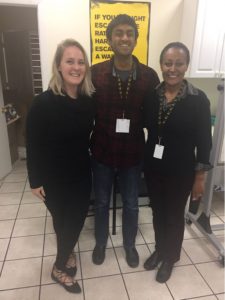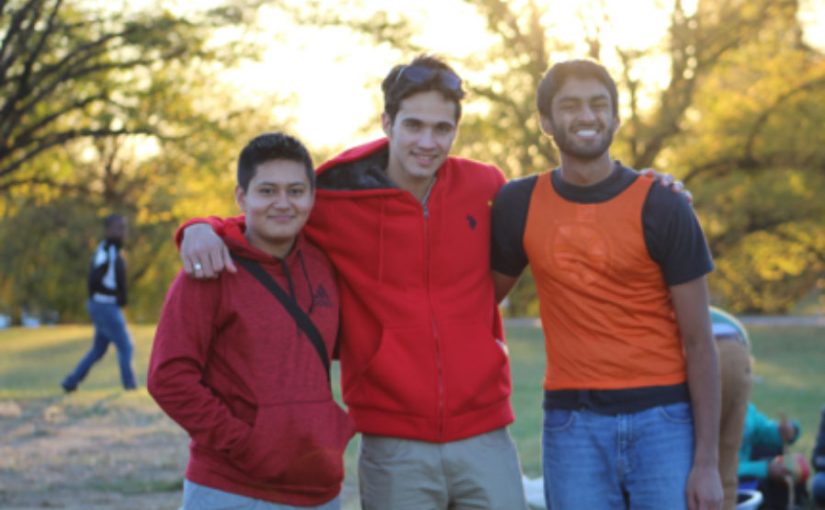Dear Class of 1957,
Near the end of my internship, the Baltimore IRC office held a community appreciation event at a nearby church. The event provided our staff the opportunity to thank people who collaborate with our organization and with our refugee clients. Employers like Under Armour and Chipotle, philanthropists, local school groups, families, and legislators all joined us for the dinner. My boss also invited several of our asylee clients, families who we knew would appreciate the food and community atmosphere. I stood in the back of church with Mohammed, a tall, quirky 22-year-old Iraqi refugee that I had become especially close with. Without our translator it was difficult to communicate, but we both appreciated the company and welcoming atmosphere.
The guest keynote speaker, a local politician from Maryland, opened the night. Speaking in waves of passion, arms rising above his grey hair and pale face, he congratulated donors and volunteers on their influence helping Syrian refugees. He described our clients as cold, hungry, tired and weak families, welcomed with open arms into communities. He called us “heroes…reaching down, lifting Syrians up and saving their lives”.
Mohammed chuckled next to me, saying in broken English “That man does not talking about me.” He smiled. I shrunk farther back in the audience, embarrassed, praying that neither Mohammed nor our other asylee guests could understand the way the congressman described them. Despite having lived in camps across Iraq, Syria and Turkey, Mohammad and his family all possessed a warm sense of humor and pragmatic resilience. They proudly worked night shifts at a jewelry factory to make ends meet, and burst into our office smiling on Monday mornings to show us their newest paystubs. Certainly they were not the ones being “saved” by our team.
The IRC attracts employees who are knowledgeable and passionate about refugee resettlement. Many caseworkers are experts in the field because they and there families are immigrants, with firsthand experiences with the resettlement process. My boss is a political asylee from Ethiopia, and others in our office are Palestinian, Sudanese, Iraqi and Burmese. The American-born employees come from similarly diverse cultural, linguistic and ethnic backgrounds, heritages that allow them to communicate professionally and personally with our clients. This diversity has allowed the IRC to be notably void of a patronizing mentality. In the office, refugees are just clients, who looking like and talking like our employees. No one is “reaching down” to help them; they are served the same way any business helps its customers.

The refugees I’ve met certainly are not the stereotypical weak and feeble people the politician described. In fact, we work each day to empower people to move beyond this unflattering image, so they can get accustomed to working and living in the USA. I have been consistently humbled by our clients, people who inspire me each day to work towards building a more hospitable world. Women like Zahra, who learned six languages fluently by watching foreign TV programs in Afghanistan, and now translates at John’s Hopkins trauma center. Or Carine, a sixteen-year old asylee from Cameroon who waited eight years to rejoin her father in Baltimore. While most American girls her age are learning high-school algebra, she’s starting college nursing courses only two months after arriving to the country. Many of our clients were forced to flee promising careers by war and conflict. Aasif, an interpreter for the US Army in Afghanistan, is pumping gas right now in a Baltimore suburb, preparing for the day he can start his own company in Washington. And, Aamira, a woman who wraps sandwiches at a local deli in her brightly colored hijab, once ran a large non-profit consulting firm in Sudan.
Our clients will accomplish incredible things in their new American communities, and many are already underway building these dreams. Above all else, this term has taught me to treat refugees and asylees with the respect they deserve. Our nation should believe in them, too. Because at the end of the day, unless our nation can move past viewing immigrants as “weak and feeble refugees”, we can never fully embrace the powerful, intelligent, savvy, frustrated and complex individuals they truly are.
Best,
Milan Chuttani ‘18
**names have been modified in this post to preserve the anonymity of IRC clients**

